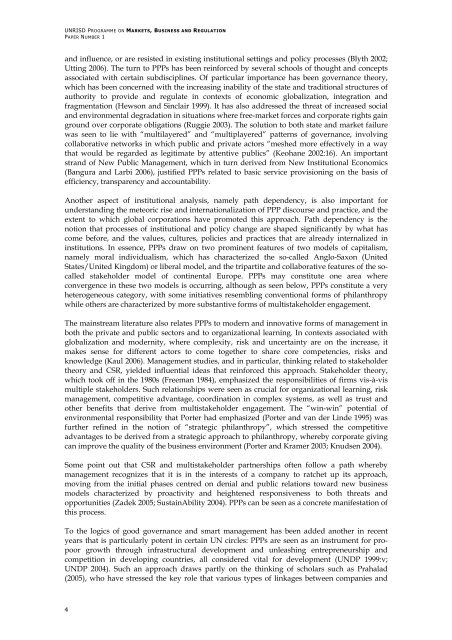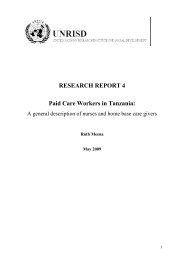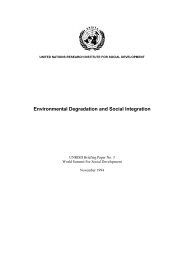Beyond Pragmatism: Appraising UN-Business Partnerships
Beyond Pragmatism: Appraising UN-Business Partnerships
Beyond Pragmatism: Appraising UN-Business Partnerships
Create successful ePaper yourself
Turn your PDF publications into a flip-book with our unique Google optimized e-Paper software.
<strong>UN</strong>RISD PROGRAMME ON MARKETS, BUSINESS AND REGULATION<br />
PAPER NUMBER 1<br />
and influence, or are resisted in existing institutional settings and policy processes (Blyth 2002;<br />
Utting 2006). The turn to PPPs has been reinforced by several schools of thought and concepts<br />
associated with certain subdisciplines. Of particular importance has been governance theory,<br />
which has been concerned with the increasing inability of the state and traditional structures of<br />
authority to provide and regulate in contexts of economic globalization, integration and<br />
fragmentation (Hewson and Sinclair 1999). It has also addressed the threat of increased social<br />
and environmental degradation in situations where free-market forces and corporate rights gain<br />
ground over corporate obligations (Ruggie 2003). The solution to both state and market failure<br />
was seen to lie with “multilayered” and “multiplayered” patterns of governance, involving<br />
collaborative networks in which public and private actors “meshed more effectively in a way<br />
that would be regarded as legitimate by attentive publics” (Keohane 2002:16). An important<br />
strand of New Public Management, which in turn derived from New Institutional Economics<br />
(Bangura and Larbi 2006), justified PPPs related to basic service provisioning on the basis of<br />
efficiency, transparency and accountability.<br />
Another aspect of institutional analysis, namely path dependency, is also important for<br />
understanding the meteoric rise and internationalization of PPP discourse and practice, and the<br />
extent to which global corporations have promoted this approach. Path dependency is the<br />
notion that processes of institutional and policy change are shaped significantly by what has<br />
come before, and the values, cultures, policies and practices that are already internalized in<br />
institutions. In essence, PPPs draw on two prominent features of two models of capitalism,<br />
namely moral individualism, which has characterized the so-called Anglo-Saxon (United<br />
States/United Kingdom) or liberal model, and the tripartite and collaborative features of the socalled<br />
stakeholder model of continental Europe. PPPs may constitute one area where<br />
convergence in these two models is occurring, although as seen below, PPPs constitute a very<br />
heterogeneous category, with some initiatives resembling conventional forms of philanthropy<br />
while others are characterized by more substantive forms of multistakeholder engagement.<br />
The mainstream literature also relates PPPs to modern and innovative forms of management in<br />
both the private and public sectors and to organizational learning. In contexts associated with<br />
globalization and modernity, where complexity, risk and uncertainty are on the increase, it<br />
makes sense for different actors to come together to share core competencies, risks and<br />
knowledge (Kaul 2006). Management studies, and in particular, thinking related to stakeholder<br />
theory and CSR, yielded influential ideas that reinforced this approach. Stakeholder theory,<br />
which took off in the 1980s (Freeman 1984), emphasized the responsibilities of firms vis-à-vis<br />
multiple stakeholders. Such relationships were seen as crucial for organizational learning, risk<br />
management, competitive advantage, coordination in complex systems, as well as trust and<br />
other benefits that derive from multistakeholder engagement. The “win-win” potential of<br />
environmental responsibility that Porter had emphasized (Porter and van der Linde 1995) was<br />
further refined in the notion of “strategic philanthropy”, which stressed the competitive<br />
advantages to be derived from a strategic approach to philanthropy, whereby corporate giving<br />
can improve the quality of the business environment (Porter and Kramer 2003; Knudsen 2004).<br />
Some point out that CSR and multistakeholder partnerships often follow a path whereby<br />
management recognizes that it is in the interests of a company to ratchet up its approach,<br />
moving from the initial phases centred on denial and public relations toward new business<br />
models characterized by proactivity and heightened responsiveness to both threats and<br />
opportunities (Zadek 2005; SustainAbility 2004). PPPs can be seen as a concrete manifestation of<br />
this process.<br />
To the logics of good governance and smart management has been added another in recent<br />
years that is particularly potent in certain <strong>UN</strong> circles: PPPs are seen as an instrument for propoor<br />
growth through infrastructural development and unleashing entrepreneurship and<br />
competition in developing countries, all considered vital for development (<strong>UN</strong>DP 1999:v;<br />
<strong>UN</strong>DP 2004). Such an approach draws partly on the thinking of scholars such as Prahalad<br />
(2005), who have stressed the key role that various types of linkages between companies and<br />
4
















